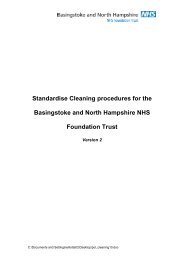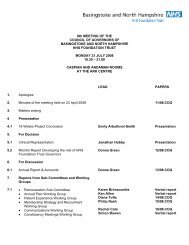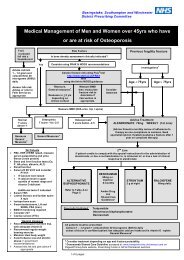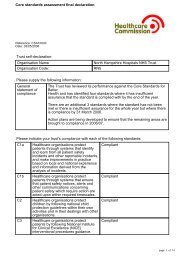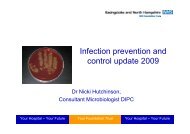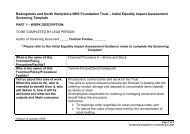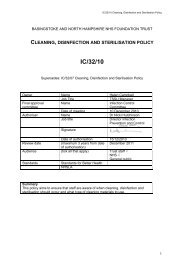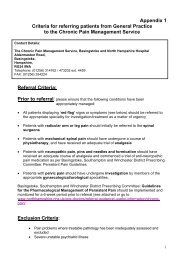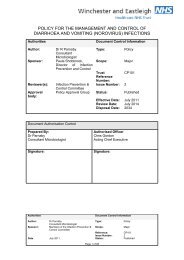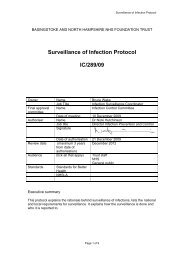Isolation and infectious diseases policy - Hampshire Hospitals NHS ...
Isolation and infectious diseases policy - Hampshire Hospitals NHS ...
Isolation and infectious diseases policy - Hampshire Hospitals NHS ...
You also want an ePaper? Increase the reach of your titles
YUMPU automatically turns print PDFs into web optimized ePapers that Google loves.
Winchester & Eastleigh Healthcare <strong>NHS</strong> Trust<br />
Policy for <strong>Isolation</strong> <strong>and</strong> Infectious Diseases Policy<br />
See CP073 H<strong>and</strong> hygiene Policy<br />
Unnecessary precautions must be avoided; they will only worry the<br />
patient <strong>and</strong> waste valuable time <strong>and</strong> equipment.<br />
9.5 LINEN<br />
The door must be closed when changing the bed linen to reduce<br />
dissemination of skin scales/spores. Place all linen in an alginate bag in the<br />
room, then transfer into a red plastic bag at the doorway. This is to prevent<br />
dissemination of organisms <strong>and</strong> to give additional protection to laundry staff.<br />
9.6 WASTE<br />
Discard disposable items or those soiled with infected material into an orange<br />
plastic bag in a foot operated bin.<br />
9.7 DECONTAMINATION OF EQUIPMENT<br />
Non-disposable items must be decontaminated before removing from the<br />
room to prevent transfer of organisms. See CP030 Overarching<br />
Decontamination Policy.<br />
9.8 CUTLERY AND CROCKERY<br />
Use normal cutlery <strong>and</strong> crockery. These must be washed in the ward<br />
dishwasher or main kitchen dishwasher with a final rinse temperature of 80<br />
degrees centigrade. Meal trays will be the same as those for other patients<br />
<strong>and</strong> should be returned to the kitchen in the meal trolley with everyone else’s.<br />
These items must not be washed by h<strong>and</strong> as the temperature is inadequate to<br />
decontaminate.<br />
9.9 TOILETING<br />
Faeces/urine/vomit should be disposed of directly into a macerator. Then<br />
remove apron <strong>and</strong> gloves <strong>and</strong> wash h<strong>and</strong>s. Prompt disposal <strong>and</strong> disinfection<br />
is essential to prevent transmission of organisms to other patients.<br />
NB Protective clothing worn in the isolation room may be worn when walking<br />
straight to the sluice room <strong>and</strong> discarded into an orange clinical waste bag<br />
immediately after disposal of excreta. H<strong>and</strong>s must then be washed <strong>and</strong> dried<br />
<strong>and</strong> alcohol gel applied.<br />
9.10 VISITORS (FRIENDS AND FAMILY)<br />
Explain the reason for isolation, ensuring confidentiality is maintained at all<br />
times. Visitors must be instructed to wash their h<strong>and</strong>s before entering <strong>and</strong><br />
leaving the room. Usually no other precautions are necessary, unless<br />
14<br />
Authorities<br />
Document Control Information<br />
Author:<br />
Sponsor:<br />
Date:<br />
Dr Kordo Saeed<br />
microbiologist<br />
Sue Dailly Lead Nurse<br />
Infection Prevention <strong>and</strong><br />
Control<br />
Paula Shobbrook Director of<br />
Infection Prevention <strong>and</strong><br />
Control<br />
01/08/11<br />
Type:<br />
Scope:<br />
Reference:<br />
Issue No:<br />
Status:<br />
Policy<br />
Major<br />
CP022 (IC 04)<br />
4<br />
Published



